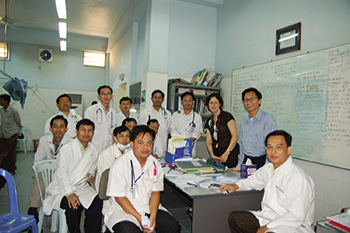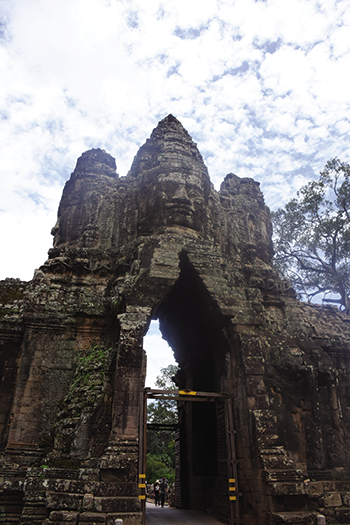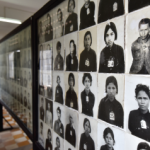
Dr. Seligman (black shirt) teaches trainees in the hospital’s emergency department in 2007.
In 2001, Victoria Seligman, MD, MPH, was vacationing in Vietnam. While traveling by train, she met a student from Yale University who was working on the school’s Cambodian Genocide Program, which documents the atrocities that occurred in Cambodia between 1975 and 1979 under the Khmer Rouge regime. Approximately 1.7 million people—representing 21% of the population—were slaughtered. Roughly 30 doctors remained alive in the entire country.
“It was a fluke meeting this woman,” says Dr. Seligman, assistant professor of medicine at the University of Colorado Health Sciences Center, Denver. “I didn’t know anything about Cambodia and became intrigued.”
Finding a Way to Help
Dr. Seligman will never forget the horror stories she heard from the woman on the train. They reminded her of the stories shared by Jewish Holocaust survivors in her hometown, New York. She vowed to find a way to help.
In 2003, Dr. Seligman searched online for volunteer opportunities in Cambodia and discovered Health Volunteers Overseas (HVO), a nonprofit that builds healthcare capacity in developing countries. She emailed the organization, inquiring about opportunities in Cambodia, and received a same-day response: “Are you interested in starting an internal medicine program?”
A Clinic Established

South gate tower of Bayon Temple, Angkor Thom, Cambodia.
It didn’t take much to persuade her. In 2004, she traveled to Cambodia as the HVO volunteer program director to find a sustainable site for a clinic and establish a training program for volunteers, in general, and specialty medicine, including rheumatology, in particular.
“At the time, Cambodia was like the Wild West,” she says, citing the lack of doctors, medical training opportunities or even federal regulations governing healthcare or providers. “There was no such thing as specialty training or clinics in the country. Even now, specialty medicine is still in its infancy, despite the great strides we’ve made.”
Dr. Seligman helped develop the country’s first rheumatology clinic in Phnom Penh. She says it took approximately five years for the program’s physicians to become self-sufficient in rheumatology.
The clinic was housed in the Sihanouk Hospital Center of Hope complex, supported by Hope International. Initially, a daily lottery system had to be implemented given the large number of patients who traveled to the clinic for much needed care. However, that has since evolved to a sliding scale payment system that enables the very poor to receive free care.
Back then, Dr. Seligman says, nobody had smartphones or internet access. Nobody even had a dialysis machine. There were no specialists. She says the medical staff, who were mostly younger than 40, had a “huge fear” of using any complex medications, such as methotrexate, because they didn’t know how to prescribe or monitor them.


